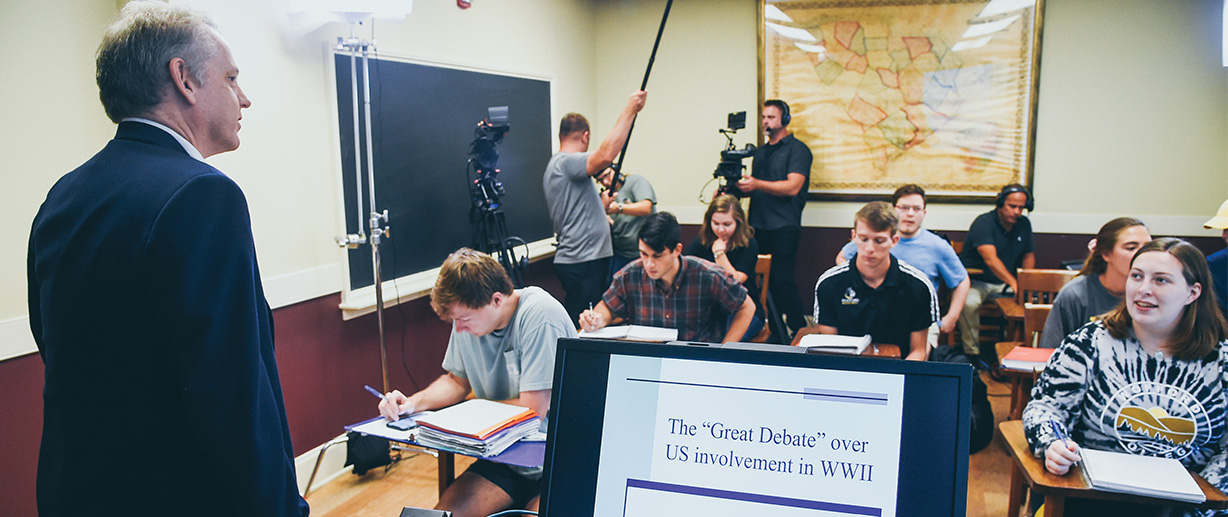A recent fall day in the classroom was a bit unusual for Dr. Mark S. Byrnes, professor and chair of the Wofford College Department of History. The seasoned professor doesn’t usually get a case of the nerves when standing up in front of his classes. This day, though, he also was in front of a C-SPAN 3 camera taping the entire lecture.
C-SPAN 3 filmed Byrnes’ class on World War II: A Global History for its “Lectures in History” weekly series. The lecture aired Dec. 7 and now is available online in C-SPAN’s video library at https://www.c-span.org/video/?464651-1/public-opinion-radio-entry-world-war-ii.
“I have to admit that I prepared a little more for this class than I do for most – in part because with a normal class, if we don’t get through the planned topic during that class time, we can always return to it at the start of the next class,” Byrnes says. “In this case, I knew I had to make sure that I timed it to ensure that the entire topic was covered in the course of one class period. I was also aware that the cameras would catch every ‘um’ or verbal stumble, so I wanted to make sure I was well-practiced before the class.”
The taping was sparked when Byrnes presented a paper – “The ‘Air War’: How the Great Debate over World War II Revolutionized Politics on the Radio” – in April 2018 at the Organization of American Historians conference in Sacramento, Calif. After the presentation, Byrnes was interviewed for C-SPAN 3’s “American History TV” program. That opened the door for the “Lectures in History” series, for which the network visits college and university campuses recording history classes. (The “American History TV” interview can be seen here: c-span.org/video/?444011-11/radio-world-war-ii-era-politics.)
Byrnes approached the producer, thinking the topic of his class might be the right opportunity, and it was. “I asked her this past summer whether she’d be interested in a class on U.S. public opinion before American entry into the war, and she agreed that would make a good topic, and we settled on a date.”
For senior Della Huffines, having TV cameras in the classroom gave her a new appreciation for her Wofford experience.
“I definitely will remember this class going forward because it was meaningful to me to see how my classes can interact with the world outside of Wofford,” says Huffines, a history and international affairs major from Raleigh, North Carolina. “Knowing that our class and Dr. Byrnes’ lecture would be on TV gave me a new perspective on how my education at Wofford will go beyond my four years here and outside of the everyday classroom setting.
“It was strange at first, but it was easy to forget they were there when I became engaged in Dr. Byrnes’ lecture,” she continues.
Mary Stewart Wilson, a senior history and government major from Folly Beach, South Carolina, says knowing that she was in the middle of a lecture that others will watch on a screen was fun. “I think Dr. Byrnes always does a good job of making history relevant to our lives today. I always look forward to his classes because he provides new insights and perspectives into historical events that we have always known about, such as World War II, but makes us question the popular American narrative surrounding these events, which I think is something everybody should be exposed to.”
Senior Rebecca Byrd, a biology major with a minor in history from Summerville, South Carolina, says she’ll always remember this class. “History is one of my favorite areas of study, especially 20th century topics, and I think people are better off having knowledge of historical events. I understand that not everyone has these kinds of opportunities, so if this lecture is something that can go beyond the walls of a Wofford classroom, I think that will be powerful and informative.”
Byrnes says he was concerned at first that having cameras in the class would bother students, “but they seemed just fine with it, even a little excited that day that a class they were taking was being filmed. “I think it was useful having the crew in the classroom to drive home that an outside organization thought that the material we were talking about in our class could have a wider appeal to the C-SPAN audience.”
By Laura H. Corbin
